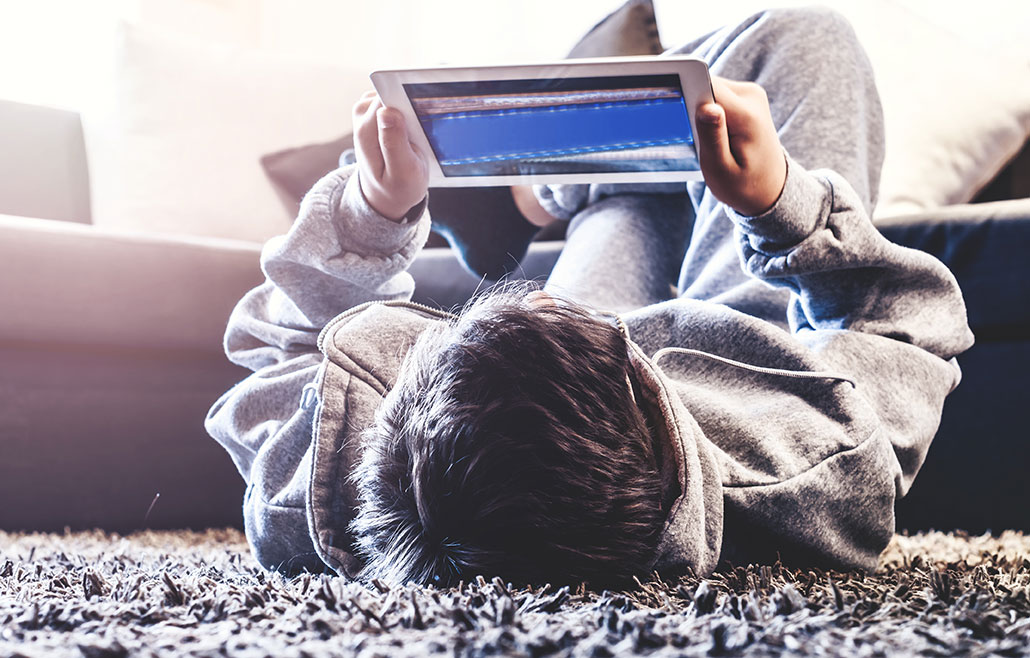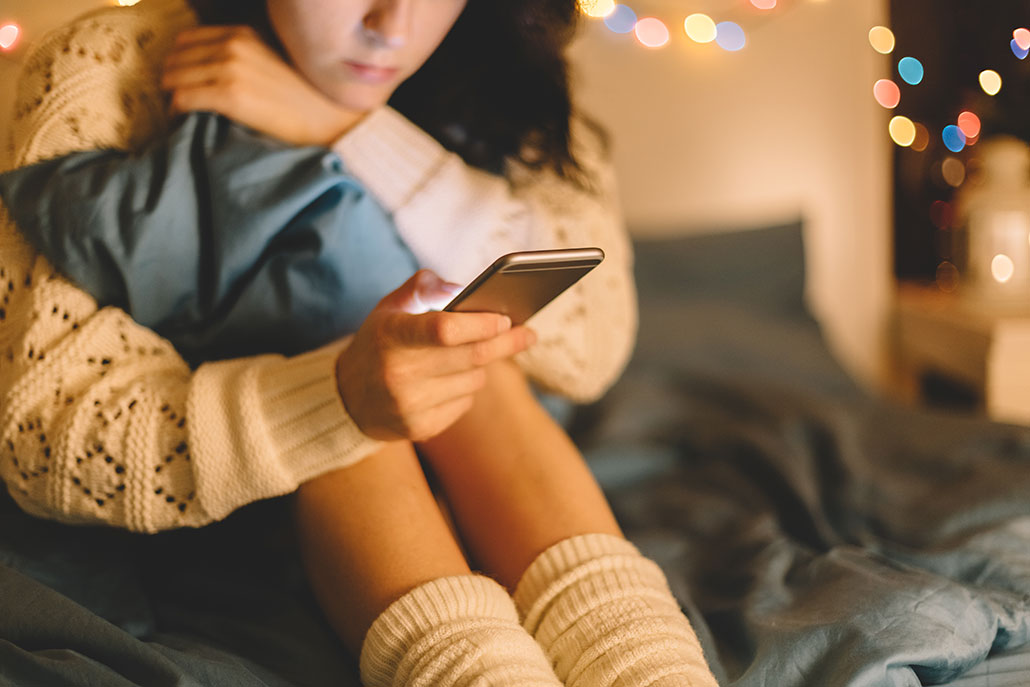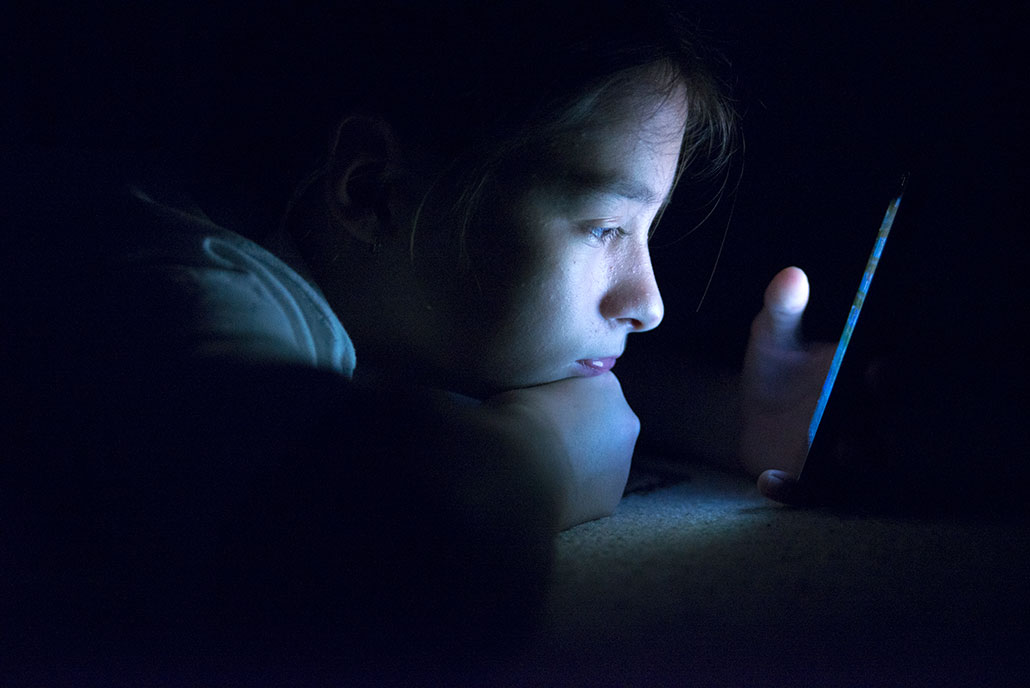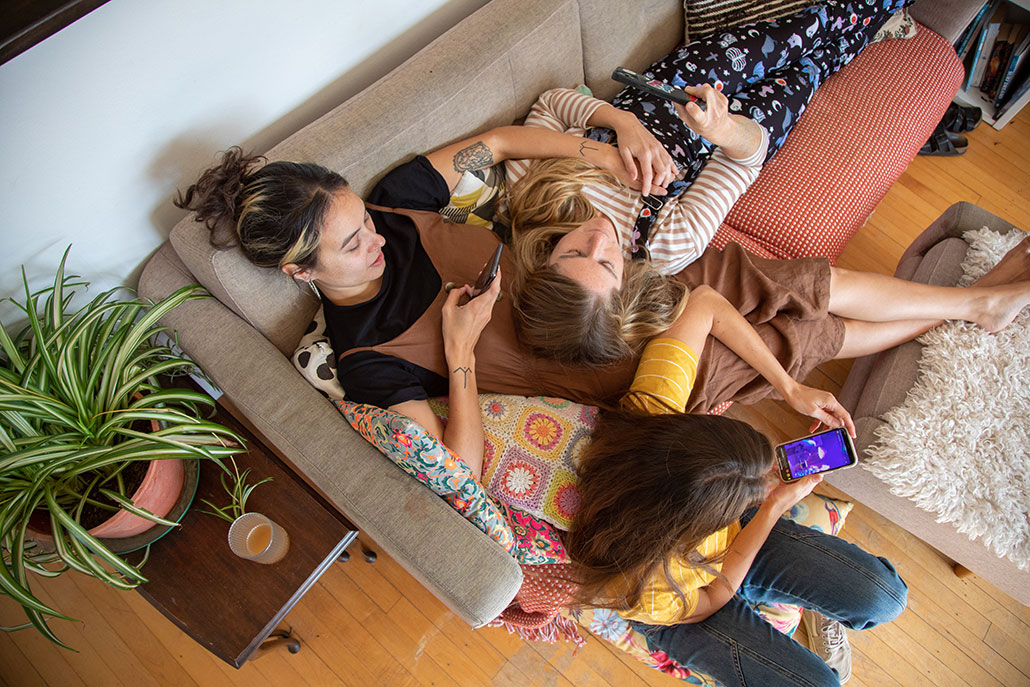Top 10 tips for how Gen Z’ers can get the best online experiences
Science points to how you can maximize screen time’s benefits while limiting its risks

Smartphones can be a great way to connect with friends. Learn how to reap these benefits while managing the risks of life online.
Maskot/Getty Images
Being online is “essential” for 18-year-old Sam Cao of Mason, Ohio. The teen graduated from high school this past June. “Everyone is on technology,” he says. “It’s really hard to communicate with anyone without social media.”
That social media, he adds, “has sparked a movement among young people with their political activism.” By that, he means their active involvement with social issues.
Sam used it to connect with like-minded people beyond his local area. He even used social media to run for the Ohio state legislature when he was 17. Although Sam lost his 2022 primary race, he remains active in politics. (He’s also urging as many older teens and young adults as possible to register and vote.)
Platforms like Instagram and X (formerly Twitter) alert Sam to breaking news, too. “Of course, I also use Google to check the sources directly,” he adds.
Yet screen time has its downsides, the teen says. For example, while many people supported Sam’s run for office, he also had to deal with some nasty comments.
Ninety-seven percent of U.S. teens surveyed by the Pew Research Center last year said they go online daily. About 95 percent report having a smartphone. Roughly one-third think they spend too much time on social media, yet more than half said it would be at least somewhat hard for them to give up access to it.
Researchers agree that some online experiences can benefit even young members of Generation Z. But studies have also linked time spent online with mental-health issues. These have included anxiety, depression, unhappiness over how one looks and too little sleep.
As the Pew data show, screen time is part of the daily lives of today’s teens and tweens. So, how can you get the most from your screen time, while managing the risks? We surveyed the experts and these are their top 10 tips.

1. Be active instead of passive.
Choose what you do and view. Chat over video with friends or family. Write or comment on posts. Even create works of art. “You can have really meaningful, supportive conversations” with friends, says Sam Ehrenreich. Or, you can check in with parents when you’re away from home. Such “active” screen time can help Gen Z’ers deal with some of the challenges they encounter, explains this psychologist at the University of Nevada at Reno.
He contrasts this with “passive” screen time — “sitting there and scrolling continuously, without actually interacting with anybody.” That can sometimes be a downer. Teens tend to compare themselves unfavorably to what they read on Instagram and elsewhere. This may lead them to feel they’re missing out on all the great experiences that make others seem so happy and accomplished. Or they may just feel left out.
Ehrenreich’s team reviewed these and other insights about active and passive screen time for an analysis in the Journal of Research on Adolescence.
2. Think about what makes you feel good — and what doesn’t.
“Start by being honest with yourself about when your tech use makes you feel good,” says Emily Weinstein. She’s a social scientist at Harvard University in Cambridge, Mass. She co-wrote a book about healthy online behaviors called Behind Their Screens: What Teens Are Facing (and Adults Are Missing).
“Once we start noticing our experiences more intentionally, we can be more mindful and intentional about making changes,” Weinstein says. “The changes will look different for different people.”
You might feel good catching up with out-of-town family members, for example. Keep doing those things, as time allows. But some people’s posts might make you feel angry or anxious. Or, you might enjoy some kinds of videos but feel inadequate as you watch others. Figure out what those things are. Then avoid the negative ones.
Also, be wary of and report online racism, bullying or other hurtful material if you come across it. That suggestion comes from a new health advisory. The American Psychological Association issued it this past May.

3. Have a plan when you go online.
Alissa Mrazek also advocates being intentional about what you do online. She’s a research psychologist at the University of Texas at Austin. In short, choose what you will do online. And plan something else to do offline after you finish.
“If you don’t have any kind of exit strategy, then it’s really easy to go from that dog training video to scrolling pictures of cute dogs for two hours,” Mrazek says. Tech companies profit from keeping your eyes on their content for as long as possible. That’s why many apps are designed to be time-sinks.
Check if apps have a built-in tool to let you limit your time on them. Or set a timer on your phone that will remind you when to log off.
4. Focus on one thing at a time.
Working on math homework while texting with a friend may sound productive. But it actually wastes time.
Digital devices and mind-wandering account for much of the time teens are distracted from their homework, Mrazek says. She was part of a research group that attempted to tally that. Those distractions, they report, averaged an extra 204 hours per year per person! That’s the waking hours of almost 13 days each year during which teens could do something more fun than homework. That’s also equal to nearly every waking hour each weekend for two months.
Her team reported its findings in Educational Sciences in 2021.
Besides wasting time, multitasking may make it harder to learn the material in your homework, Mrazek adds. Despite what you may think, she points out that science has shown “we can’t learn two things at a time.”
Planning can cut down on distractions, she says. Have a prewritten reply ready for texts or calls you get during homework time, such as “Can’t chat now.” Better yet, put the phone on “do not disturb” or leave it outside the room.
“Most teenagers never learn how to focus their attention,” Mrazek adds. Yet when we do focus, “we’re going to get our homework done faster.” To help, she and others developed a free online course, called Finding Focus.
5. Support your friends online.
For the most part, connecting online can strengthen relationships, says Lucía Magis-Weinberg. She’s a developmental psychologist at the University of Washington in Seattle. People in your online circle can help you feel better if you’re upset, she notes. They can help you get information. They can make you feel part of a group.
Magis-Weinberg and others noted these benefits in a review of studies about 8- to 12-year-olds in lower- and middle-income countries. The review appeared in Frontiers in Psychology.
But there’s often a mix of good and bad in life online, Magis-Weinberg adds. People’s actions online mirror how they act offline. So, “it’s unrealistic to ask our online friendships to be completely rosy and completely perfect when our in-person friendships are never like that.” Accept that and be ready to deal with snags that sometimes crop up, she suggests. Reach out privately if a friend hurts your feelings, for example. And say you’re sorry if you were wrong.
Also, just as bullying is a problem in real life, cyberbullying happens far too often online. Unlike friends, bullies aim to pick on people over and over. When it happens, speak up. Tell a trusted adult and support your friends. And block anyone who bullies you or uses hate speech online.
6. Be realistic about what you see online.
“We don’t post Instagram pictures of us sitting at home bored,” notes Ehrenreich at the University of Nevada. Neither do your friends! Like you, they have homework, chores, school and other not-so-fun responsibilities. They don’t usually look picture-perfect. Some teens, however, “spend an incredible amount of time making sure what they post is perfect,” he observes.
Without that reality check, you may feel left out when you see fun party scenes or glamour-shot posts. You may feel jealous. Or you may feel bad about how you look. Chances are your friends feel the same way, so talk about it with them.
“So many of us feel the instinct to compare [ourselves] to others,” says Weinstein at Harvard. But, she adds, “When we give voice to these feelings, we help reduce some of their power.”

7. Get support online.
Online groups can sometimes be very helpful, Ehrenreich says. For instance, teens might have health issues that can feel very isolating. Someone’s local family and friends might not understand the challenges of chemotherapy or surgery complications. In those cases, online groups can provide general support, insights and shared perspectives.
But be careful how much you share, Ehrenreich warns: Not everyone online is who they say they are.
Also, he adds, if you feel particularly upset or need advice for a very specific situation, “that’s the point that you really need to be looking for counseling services” in real life. A trusted adult or healthcare provider can connect you with the right people. Remember the 24-hour 988 free suicide hotline and the 211 free mental health crisis numbers, too.
Online groups also can help Gen Z’ers in communities that have faced discrimination. Linda Charmaraman heads the Youth, Media & Wellbeing Lab at Wellesley Centers for Women in Massachusetts. In one project, she and others surveyed more than 1,000 10- to 16-year-olds. LGBTQ young people were more likely than other teens and tweens to join online groups to reduce feelings of isolation or loneliness. Her group reported these results in JMIR Mental Health.
Online support groups aren’t just for dealing with problems. They also can help you explore interests as you figure out who you are and what you enjoy. “We love hearing from teens about the ways they use social media and screens to pursue different interests and hobbies,” Weinstein says — “from BookTok to accounts that teach new skills related to sports, art, music, makeup or any number of other things.”

8. Learn how platforms and tech tools work.
No one expects you to be an expert driver the first time you get behind the wheel of a car. Yet many teens and tweens get smartphones without knowing how to handle online risks, notes Magis-Weinberg at the University of Washington. Training can help.
One example is Social Media TestDrive. It was developed by researchers at Cornell University in Ithaca, N.Y. Twelve sessions cover topics such as passwords, privacy and healthy screen habits.
Another program is the Common Sense Digital Citizenship Curriculum. Weinstein and others described this program and research behind its topics — such as cyberbullying and news literacy — in a 2021 report.
Magis-Weinberg and others combined topics from the Common Sense program with units about sleep habits, managing emotions and more. The group tested this training course with young teens in Peru.
Those who used the program had slightly more positive online experiences compared to students who didn’t use it. Users also seemed to do slightly better at solving online conflicts without help. The researchers shared their findings last February in Child and Adolescent Mental Health.
Informal connections can also help you learn how to use social media in helpful ways. One survey found that many adolescent girls seek advice from peers, parents and other family members. Charmaraman of the Wellesley Centers for Women and others shared these findings in Information and Learning Sciences last August.
9. Protect your privacy.
Whatever platforms you use, learn who can see your posts and how to change your privacy settings. Know how to report problems, such as abusive posts. And “be careful of what you post,” says Sam Cao, the Ohio teen. Photos, videos and other posts become part of your digital footprint.
Think of it as your digital brand, Charmaraman says. As you apply for schools or jobs, colleges or employers may look at your online profiles. But even before then, think about your online image. Is that really how you want others to see you?
“There’s a [tendency] to overshare every detail of your life,” Sam Cao adds. “I think it’s very important to leave some things private.”
Your favorite movie or your cat’s photo may not be dangerous for someone online to see. But tech companies may use that information to flood you with ads. “It can be a nuisance,” says Charmaraman. And another time-waster.
Sharing other details about yourself online, such as your birthplace, parents’ full names or planned vacation dates, may leave you vulnerable to scammers. Some strangers online may endanger you — either your personal safety or your wallet. They can do this through phishing or other scams. Control who is in your online network, Charmaraman suggests.
Be extra wary if someone pressures you to send them sexually explicit images or messages. Sadly, you can’t always trust what someone says in the moment — even if you’re dating that person. “You just don’t know what’s going to happen to that once you break up,” Charmaraman notes.
If someone does something “really heinous,” like publicly share explicit images, report it to the platform, she says. If you’re younger than 18, many platforms will take down offensive images. People who spread the images may face consequences, too.

10. Set limits, and ask others to respect them.
“There is so much that can be great about tech, but it’s also totally normal to need boundaries to make sure your tech isn’t taking over your life,” says Weinstein.
For starters, you need your sleep — and screen time can mess with that. “So getting phones out of the bedroom is really good for teenagers,” Ehrenreich says. Phone settings can remind you to turn the device off so you can wind down.
Set limits with friends, too. Tell them you want to limit screen time during homework, before bedtime or at meal times. Let them know not to expect you to respond to texts or calls right away.
If you don’t like how you look in a photo someone posted, ask them to take it down or at least remove your name tag. Or just ask each other for permission before tagging photos, Magis-Weinberg suggests.
And when you’re with your friends in real life, “be with your friends,” Ehrenreich says. Agree to put off answering calls or texts unless it’s a parent, for example.
Weinstein has also heard teens say they put phones in a stack or out of sight when they hang out.
Take time for yourself without screens, too, Sam Cao adds. He likes to spend time in nature, for example. Added benefits: You can cut down on sitting time and get in some exercise.

Bonus: Give yourself room to grow.
At some point you’ll almost certainly make a mistake or have a problem online. “It’s helpful to plan for hard moments before we’re in them,” says Weinstein.
“Try to think of three different people you might turn to” if something about life online makes you feel worried, anxious or uncomfortable, she says. “Think about strategies that have helped you distract yourself or get through tricky moments in the past.” You might make a list of things to do when you’re feeling down.
Also remember that how you act online and what you want others to see from your online presence will probably change over time. As Magis-Weinberg says, “That’s part of the journey. And it’s part of the learning.”







